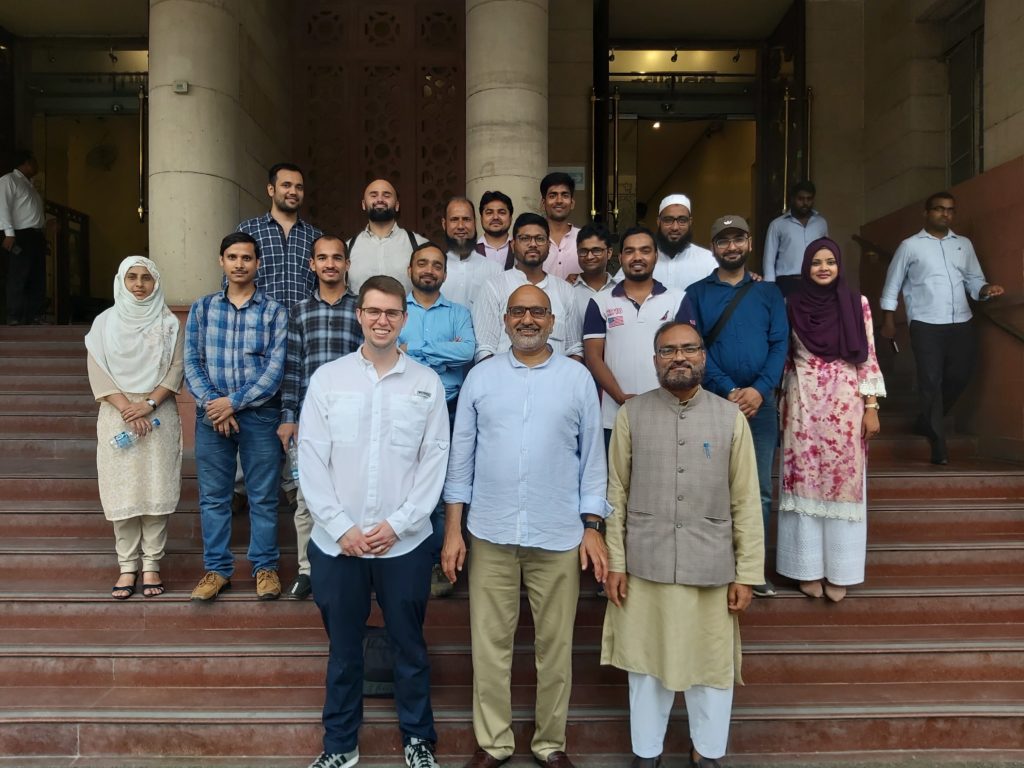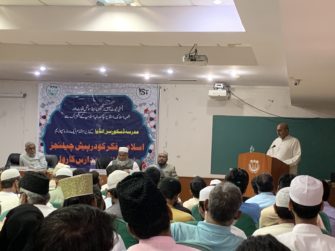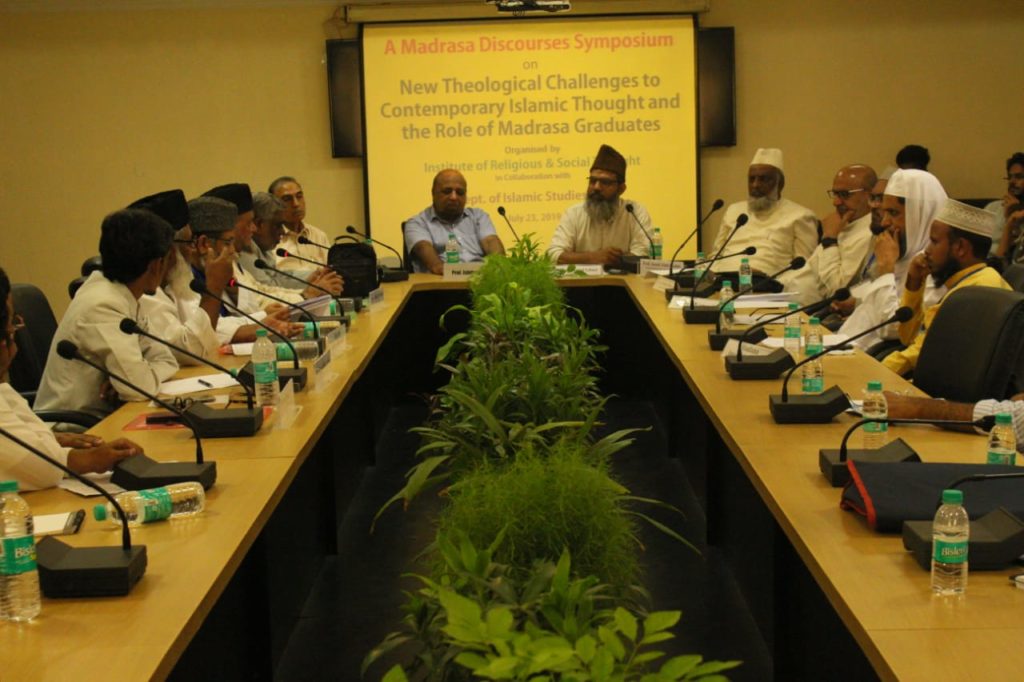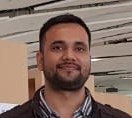
At the end of its four-day long intensive program (July 23–26, 2019) conducted in New Delhi, India, Madrasa Discourses (MD) bid the first batch of its Indian participants farewell. After three years together, the very thought of a farewell was overwhelming for both the faculty and participants; overcome with strong emotions, some of them even choked up and struggled to deliver their closing comments. Nevertheless, most of them were able to express the significance of the program for the madrasa community of India. The following three points can be gleaned from their comments and impressions of the program: (1) the program taught them the value of learning and disseminating knowledge for the common good of society; (2) it trained them to interpret the Islamic tradition in the light of modern knowledge and changed circumstances—a requisite intellectual tool, indeed, to keep any tradition alive; and, (3) though the event marked their departure from the program, it did not mark the end of their intellectual journeys. The emotions and the aspirations of the participants illustrated that they had acquired a sense of responsibility towards their community, a community which is going through, in the eyes of many, an “intellectual crisis.” MD can be considered an initiative to redress this crisis.
This essay outlines the discussions among those ʿulamāʾ invited to the symposium held on the first day of the intensive program at Jamia Millia Islamia University, New Delhi, on July 23, 2019. It raises concerns about some of the approaches taken by the scholars who attended and points to alternative ways of approaching Islamic thought in the modern world. It should be noted that these are the author’s personal reflections and should not be attributed to MD or any of its faculty.

This intensive was the sixth held by MD during the last three years, and held a significance unlike previous intensives. Until now, MD had not been officially introduced to the circles of traditional ʿulamāʾ and the Muslim intellectual community of India. The first day of the program was designed to facilitate an open discussion on challenges that Islamic thought and the madrasa community have encountered. Prominent ʿulamāʾ and scholars were invited from across the country to take part in the discussion. The objective was to address the contemporary intellectual challenges to Islamic thought, and to inform the attendees that MD, with the help of the madrasa community, is committed to answering some of these challenges. The program was divided into three sessions: the first was devoted to invited lectures, and the remaining two sessions were dedicated to a discussion of the tensions between modern science, speculative theology (‘ilm al-kalām), and questions of Islamic jurisprudence (fiqh).
In the first public session, Mawlana Khalid Saifullah Rahmani, an eminent Deobandi scholar and head of the Islamic Fiqh Academy of India, delivered the keynote address. While one might have expected him to express his views on the contemporary theological challenges Muslims faced, Rahmani instead highlighted the historical phases which necessitated the emergence and evolution of early Muslim theology (‘ilm al-kalām). His understanding of ‘ilm al-kalām is fashioned after the common position which holds that the discipline is an intellectual exercise meant to defend Islamic creeds. Rahmani drew upon the historical experiences of Muslim scholastics and theologians and emphasized the need for a new-‘ilm al-kalām, which should be more comprehensive and able to address the modern challenges posed by philosophical and scientific questions. However, he made it clear that the creeds explicitly mentioned in the text are beyond the scope of any intellectual debate. Rahmani also pointed out that the entire battle between science/reason vs. religion uniquely stemmed from Christendom’s experience which turned into a battle of science/reason against religion. It then developed into a revolt against the authority of the Catholic Church followed by the persecution of philosophers and scientists. He suggested that today modern philosophy and science are composed of anti-religious elements thanks to the early opposition to both by the Catholic Church. Islam, on the other hand, had always appreciated the use of reason and thus can constructively engage with modern scientific challenges.
Rahmani’s reference to the historical development of modern science and philosophy forges a story that seeks the culprit in someone else’s camp. It holds the Church as the arch-culprit for fostering enmity between science and religion. What the purpose of such an account was intended to serve was not entirely clear. Perhaps it was intended to defend Islam and Muslims in terms of their historical encounter with science. If this is the case, the opposition of religion to philosophical exercises is not an unparalleled historical experience only found in the medieval Christian world. There are numerous examples that one can cite of anathematization of great Muslim philosophers and mutakallimūn by Muslim clergy that in some instances was followed by their persecution in the medieval Islamic world. It would be better if Rahmani engaged with the historical tensions and complexities that existed between Islamic orthodoxy and philosophy and kalām. It also might have been helpful if Rahmani demonstrated how Islamic thought dealt with contemporary science and philosophy.
Interestingly, the participants in the closed sessions concurred with Rahmani that contemporary Muslims needed a new-‘ilm al-kalām. Mawlana Mahmood Ahmad Ghazi, acting as the moderator, began the second closed session by asking whether the Islamic creeds can neatly categorize Islamic creedal doctrines into categories of debatable and non-debatable. While addressing the question, Mawlana Zishan Ahmad Misbahi stated that there are certain creeds, like the oneness of God, that are mentioned in the Qur’an, and therefore need to be left untouched. However, Misbahi claimed, those which were debated in the early history of Islam can also be debated today. Misbahi’s classification of some aspects of the creeds as fundamental and others as peripheral were consonant with Rahmani’s views, which, I think, represent the general approach taken in traditional thinking. Had the discussion continued along the same line, it could have yielded more valuable insights. However, the conversation veered in the direction of an apologetic theology, one which seeks to offer Qur’anic justifications for existing scientific beliefs. Such an approach superficially eradicates any contradictions between science and theology, but really engages neither science nor theological reasoning on their own terms. One critique that could be leveled at scholars who utilize this approach is that they entirely avoid addressing the underlying philosophical complexities—the tensions between medieval and modern presumptions about religion and science—and hence cherry-pick from a variety of available theories. Furthermore, this method of resolving contradictions between science and religion frequently fails to use a methodological framework based on sound philosophical presumptions, and rather uses an apologetic style of scriptural reasoning.
For example, one of the participants in the discussion reiterated a famous argument that the domains of religion and science are different. According to this participant, religion focuses on generating values on the basis of revelation and is thus redemptive in nature, while science concentrates mainly on developing a lifestyle that is compatible with technological advancement. This participant claimed the latter thus has nothing to do with values. Though the argument seemed convincing to some in the audience, placing science and religion in two separate domains is problematic because human beings do not live their lives in ways that mirror such bifurcation. We live in a new world created by modern science and adapted to it. Treating religion as something unrelated to science is thus a grave mistake and causes contradictions in actions and beliefs.

For most of the participants, the word “science” only referred to material science. An unidentified participant suggested that one should also consider the social sciences in a discussion of science. A professor of physics claimed that the social sciences were entirely based on ignorance, or jihālat. An observer was unsure if he was being sarcastic or serious. It is interesting to note that the term jihālat or jāhili connotes, especially for Islamists, a system—social, political, or knowledge—which is essentially anti or un-Islamic.
In the last afternoon session, the discussion turned to Islamic jurisprudence. I recall a scholar trained in religious education (‘ālim pl.ʿulamāʾ) arguing that Islam prohibited slavery a very long time ago. And those Muslims who practiced it, he claimed, were actually violating the rules of Islam. Additionally, he also explained the “wisdom” embodied in one of the most famous verses of the Qur’an 4:34, which appoints men to be in charge of women. The verse states that if a wife disobeys her husband, he is allowed to strike her. The verse has been a bone of contention among feminists, modernists, and traditionalists. The ‘ālim explained that the verse allows a husband to strike his wife only if she indulges in fornication. Instantly, he was asked should a wife be allowed to strike her husband if he does the same. He replied, without taking a pause, that it would be unnatural for her to do so. To me, the overall view of the ‘ālim sounded rather odd. For example, I later discovered that his view was not supported by Islamic law which reserves the right to administer punishment exclusively for the government—there is no permission for the husband to strike a wife who engages in fornication in Islamic law.
Such explanations assume that every good which can possibly exist has already been explained in the Qur’an. On this approach, where in Western thought human rights which ground prohibitions on slavery and give equality to women are a modern development, in Islam they are much older since they originated with the revelation of the Qur’an; Islam had allocated these rights using an alternative framework to human rights fourteen centuries ago. This type of reading of the Qur’an worries me because it imposes its own modern understanding of the world onto past periods in Islamic history while ignoring the different contexts that shaped how Muslims understood and interpreted the Qur’an. For instance, the modern discourse of human rights entitles a person to certain rights, for example, freedom, equality, etc., on the basis of his/her being a human being. Hence, the word “right” in this context would be interpreted as entitlement. A violation of any human right by an individual or a state would be an affront to a human person. A comparison between the modern western conception of “right” with the medieval Islamic understanding of the word, ḥaqq (wrongly translated as a “right” like a human right) would reveal that the Muslim jurists conceived the word ḥaqq not as “entitlement” but as “duty” towards his/her fellow citizens and the state, which is contradictory to modern rights discourses (Moosa, 2000–2001). This example shows the problems that appear when one equates modern rights discourses with traditional Islamic thought. I could produce several more examples which prove a conceptual departure of Muslims from the medieval to the modern world, however, the scope of this essay does not allow it. The point is that Muslim scholars should accept this departure, show courage to shoulder the accountability of the history they inherit, and be ready to reinterpret parts of their tradition which are inconsistent with their modern experiences. Though it is easy to reject the past or confuse the modern with something already in the tradition, doing so intellectually paralyzes Islamic thought.


The writer of this piece of work seems impartial upto some an extent. Nice analysis by the writer. But I think the problem is we are expecting change from that section of the society – ” majority of Ulemas” who are the flag bearers of orthodoxy and conservatism.